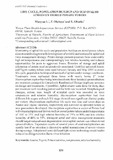| dc.contributor.author | Obutho, E | |
| dc.contributor.author | Olubayo, F. | |
| dc.contributor.author | Munyua, L. | |
| dc.date.accessioned | 2014-07-17T08:47:09Z | |
| dc.date.available | 2014-07-17T08:47:09Z | |
| dc.date.issued | 2011-09 | |
| dc.identifier.citation | Optimimization of Agricultural Value Chains for sustainable Development | en_US |
| dc.identifier.uri | http://hdl.handle.net/11295/73154 | |
| dc.description | Oral presentation at aGRO 2011 Biennial Conference | en_US |
| dc.description.abstract | Monitoring of aphid life cycle and population buildup on stored potato tubers
aims at contributing towards development of a viable and sustainable aphid and
virus management strategy. Potato storage protects potatoes from undesirably
high air temperatures and correspondingly low relative humidity and reduces
opportunities for pests to aggrevate losses. Duration of storage and aphid
infestation of potato seed are positively correlated. Certified sprouted Asante
and Tigoni variety tubers were used between January and May 2005 to assess
life cycle, population buildup and survival of aphids under storage conditions.
Treatments· were replicated three times with newly borne 2nd instar
Macrosiphum euphorbiae being introduced onto three hundred sprouted tubers
per treatment arranged in Completely Randomised Design (rephrase sentence
on design and treatments, ifpossible). Aphid counts were done for thirty days
per treatment with moulting period and the birth rate recorded. Morphological
changes, colour, size, length of nymphal cycle was recorded as were
temperature and relative humidity. Macrosiphum euphorbiae had four
different life stages and each life stage showed two significant distinct peaks
per variety. Macrosiphum euphorbiae life cycle was nine and seven days on
Asante and Tigoni varieties, respectively and survived on sprouted tubers as
new generations developed. Macrosiphum euphorbiae a vector of Potato leaf
roll virus multiplies and thrives well on stored potato tubers under temperatures
of 18°C to 25°C and high relative humidity of 75% to 90% and low relative
humidity of 44% to 55%. Stringent aphid and virus management measures
should target reduced seed degeneration since aphid vectors can infect stored
sprouted tubers. Expensive results of several years of seed multiplication are
rapidly lost if no attention is directed to aphid transmission of severe viruses
during storage. Adoption of semi-diffused light stores technology could lead to
reduced seed degeneration due to virus infection. | en_US |
| dc.description.sponsorship | National Council of Science and Technology, The Kenya Seed Company | en_US |
| dc.language.iso | en | en_US |
| dc.publisher | Faculty of Agriculture, University of Nairobi | en_US |
| dc.subject | Asante | en_US |
| dc.subject | Tigoni | en_US |
| dc.subject | Potato varieties | en_US |
| dc.subject | temperature | en_US |
| dc.subject | relative humidity | en_US |
| dc.title | Life cycle, population buildup and survival of aphids on stored potato tubers | en_US |
| dc.type | Presentation | en_US |
| dc.type.material | en | en_US |

